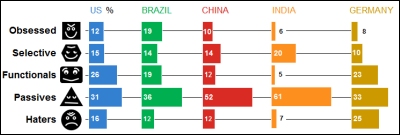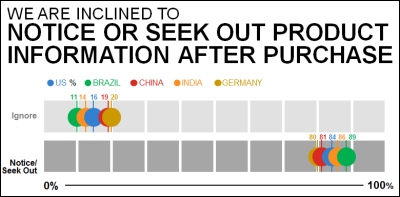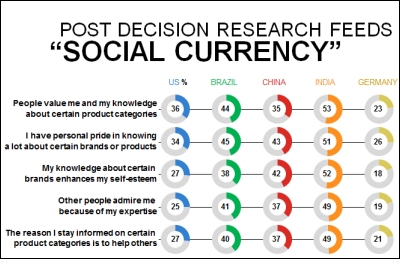Information overload may be a problem for marketers, not consumers. That was one of the ideas floated at a recent presentation on The Hidden Value in Consumers' Decisions - by Matthew Willcox, executive director of Draftfcb's Institute of Decision Making and Vicki Holgate, Draftfcb London's head of planning.
They analysed findings from consumer decision making research conducted in the USA, Germany, Brazil, India and China, and found that most respondents feel empowered by information, rather than frustrated, confused or overwhelmed. Information overload is more of a problem for marketers, noted Willcox, who have to cut through ever-louder noise to reach their audience.
According to the study, consumers fall into five categories with regards to information and decision making:
- Obsessives: compulsive researchers and enjoy research for its own sake.
- Selectives: focus on an area of interest and want to be seen as experts in that field.
- Functionals: use research to inform specific decisions.
- Passives: tend to make decisions based on ease and familiarity (e.g. choosing big brand names).
- Haters: the smallest group, who feel overwhelmed by information.
Functionals and Passives were the majority in all markets but there were significant minorities of Obsessives and Selectives.
A key insight for brands and marketers is that decision making is highly emotional and that consumers tend to seek out or notice product information after making a decision, in order to affirm they have made the right choice. Willcox noted that the biggest factor in satisfaction is not choosing the "best" product but being confident they have made the right decision. In science terms, post-decision affirmation activates the brain's reward centre, giving the individual a sense of satisfaction. From a marketing perspective, this highlights the importance of post-purchase engagement.
Happy consumers tend to be repeat buyers and, more importantly, they are natural brand advocates. The 'hidden value' for marketers lies in linking satisfied Obsessives and Selectives, who value being seen as experts, and Functionals and Passives who rely heavily on recommendations to make purchase decisions, in order to drive word of mouth. The way to achieve this positive feedback loop is to make consumers feel confident about their decisions post purchase. Offer helpful, well-organised information to make the initial decision easy; affirm it with superb customer care post purchase; then give customers the opportunity -through social media or other channels - to act as advocates.
Vicki Holgate reiterated the value of emotional satisfaction. According to IPA data, emotional ad campaigns are roughly twice as profitable as rational strategies, even in highly rational categories. The "rational mind fallacy" states that people think first, feel second and act last. But, according to Holgate, the more realistic image of the consumer is someone who feels, then acts, then uses information to retroactively justify their emotional decision. Brands that engage their consumers post-purchase help affirm these impulse decisions and, in doing so, create the sense of satisfaction that turns sceptics into believers and believers into advocates.
For more in-depth analysis of how shoppers make purchase decisions, and what leading brands are doing to influence the process, read Warc's report on Shopper Marketing: subscribers can view a full version and summary version, while non-subscribers can view a free sample version.
Finally, for more on the importance of emotion in consumer satisfaction see the Warc news story: UK brands should target different values.




